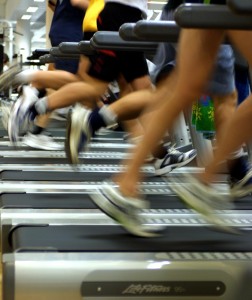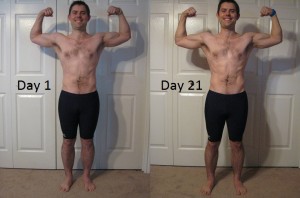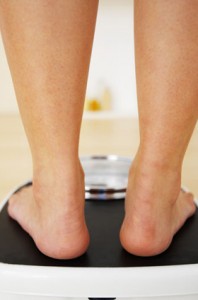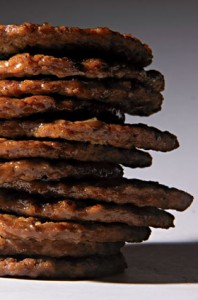Kate Fodor
Sunday, April 29, 2012
Eating less, but not losing
 Trying to slim down and feeling frustrated?
Trying to slim down and feeling frustrated?
If you’re giving it your all but the number on the scale still isn’t budging, you may be sabotaging yourself in spite of your best intentions.
Here are a dozen dieting don’ts to help save your weight-loss efforts.
You eat fake foods
We admit that prepackaged weight-loss products like shakes and bars are convenient, but they may not be helping you to lose weight in the long run.
“You never feel satisfied after you eat something like that, because it’s just a bunch of processed stuff,” says Manuel Villacorta, a registered dietician and spokesperson for the Academy of Nutrition and Dietetics.
There are lots of healthier, more filling options with the same or fewer calories, like a cheese stick or a serving of plain nonfat Greek yogurt with fresh strawberries.
You burn the midnight oil
Sure, you need to log time at the gym, but to lose weight, you also need to log time in your bed.
Skimping on sleep, especially sleeping less than five or six hours a night, can slow your metabolism and cause hormonal changes that hurt your weight-loss efforts.
Being tired may also make you eat more. One recent study found that people who are sleep-deprived consume a whopping 500 extra calories a day.
You exercise too much
Yes, you read that right. Exercise is important, but Villacorta maintains that being too focused on it can backfire.
“People think that if they exercise they will magically lose weight, and then they get frustrated,” he cautions.
In fact, about 80% of dieting time and energy should be focused on nutrition and 20% on exercise, he says. “If I have a client who’s exercising six times a week, sometimes I’ll cut that in half and have them spend the extra hours shopping and planning meals.”
You always choose the salad
Contrary to popular belief, heading for the salad bar may not be your best option.
Salads may not contain enough carbohydrates to help control hunger hormones, according to Villacorta. He suggests a healthy soup and sandwich instead, or tossing a serving of brown rice, lentils, or garbanzo beans into your greens. And beware of high-calorie salad bar additions like blue cheese and candied walnuts.
Add enough of those and “you may as well just have a burger,” he says.
You’re a high-calorie health nut
Just because a food is healthy doesn’t mean you can eat a mountain of it.
Switching from white bread to whole wheat bread, eating nuts instead of chips, using olive oil instead of butter —these are all healthy changes. But they aren’t low-calorie substitutions, so portion control is still key.
You eat too early
Popular wisdom says not to eat in the evenings, but that may not make sense unless you turn in extra early.
“People eat at 6:00 and stay up until 11:00 or midnight, so their bodies are naturally asking for fuel again,” Villacorta says. “I tell people to aim to eat 70% of their calories before dinner and 30% at dinner, but it doesn’t matter how late dinner is.” Healthy eating in the evening can prevent a late-night binge on ice cream or cookies.
You’re a loner
Remember the buddy system from your kindergarten field trips? It works for dieting, too. Studies show that support from friends and family increases the likelihood that women will lose weight.
If you can’t get what you need from your nearest and dearest, other forms of support—including advice from a weight-loss counselor or encouragement from online buddies—can also do the trick.
You never snack
To keep your metabolism at its peak, you need to eat every three to four hours.
“People think they need to eat less frequently, but really they need to eat more often, in smaller amounts,” Villacorta advises. “There’s no real reason you need to think in terms of breakfast, lunch, and dinner.”
You don’t have a diary
One large-scale study found that keeping a daily food journal doubled the amount of weight participants lost.
Researchers speculate that simply writing down what you put in your mouth makes you more accountable and cuts your daily calories.
Create your own food log or use one of the many available for free online.
You don’t like water
Substituting water for sugary sodas and even for juices can make a major dent in your daily calorie count. Drinking water may also help you manage your appetite.
In one study, people who drank two glasses of water before eating a meal consumed up to 90 fewer calories.
You skip breakfast
There’s lots of evidence that people who eat breakfast tend to have healthier weights, so start the day right by making time for a morning meal.
Experts say whole-grain cereal is one of the best breakfast choices for dieters.
It’s quick and easy, too—so there goes the excuse about not having time before work.
You hate to cook
Restaurant meals are frequently more caloric than home-cooked ones, so dust off your apron and hunt down some healthy recipes.
When you do eat out, consider splitting a meal with your date or asking the water to serve you half of your meal and have the other half boxed up to go.
Original Article:
 Stagnant wages and shaky investment markets are enough to make workers want to hit the gym to forget about their money troubles. They might just find that the treadmill offers better financial returns than Wall Street.
Stagnant wages and shaky investment markets are enough to make workers want to hit the gym to forget about their money troubles. They might just find that the treadmill offers better financial returns than Wall Street. In May, the average American worker earned $23.41 an hour, according to the Labor Department. Assuming three hours of exercise per week, enough to satisfy the minimum level used in the study, a typical worker’s time spent huffing and puffing is valued by the labor market at $70.23. His extra pay over a 40-hour work week is worth $84.28–about 20% more.
In May, the average American worker earned $23.41 an hour, according to the Labor Department. Assuming three hours of exercise per week, enough to satisfy the minimum level used in the study, a typical worker’s time spent huffing and puffing is valued by the labor market at $70.23. His extra pay over a 40-hour work week is worth $84.28–about 20% more.














